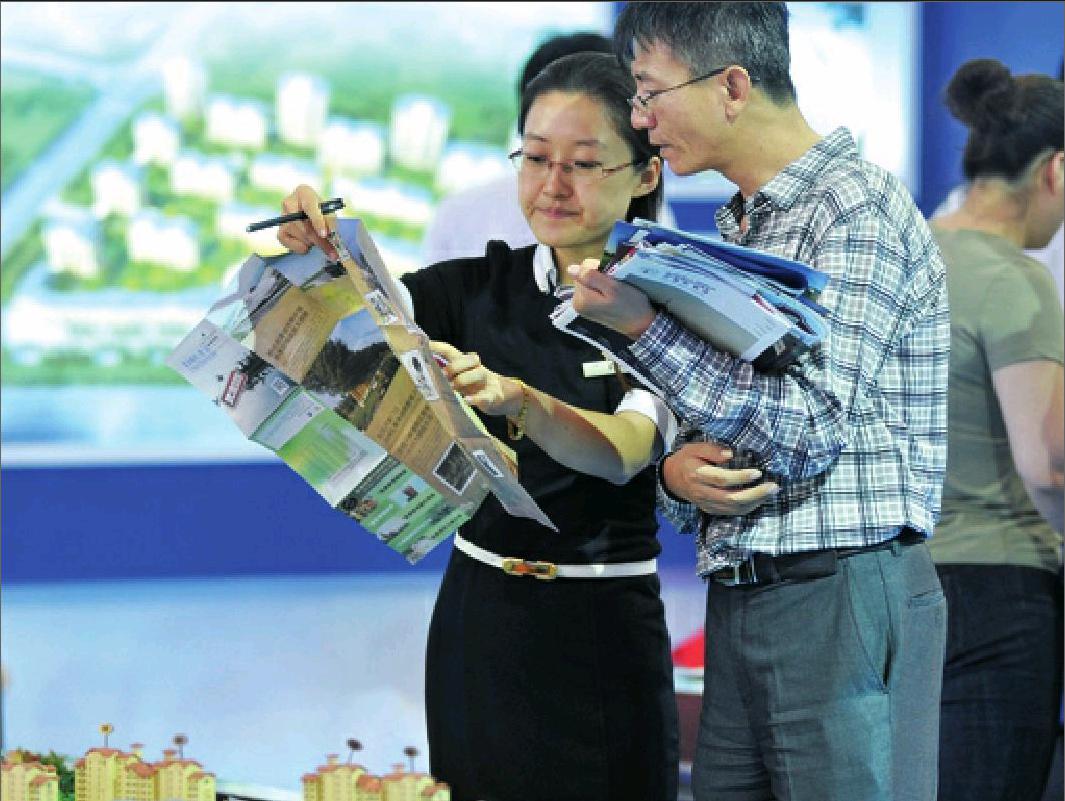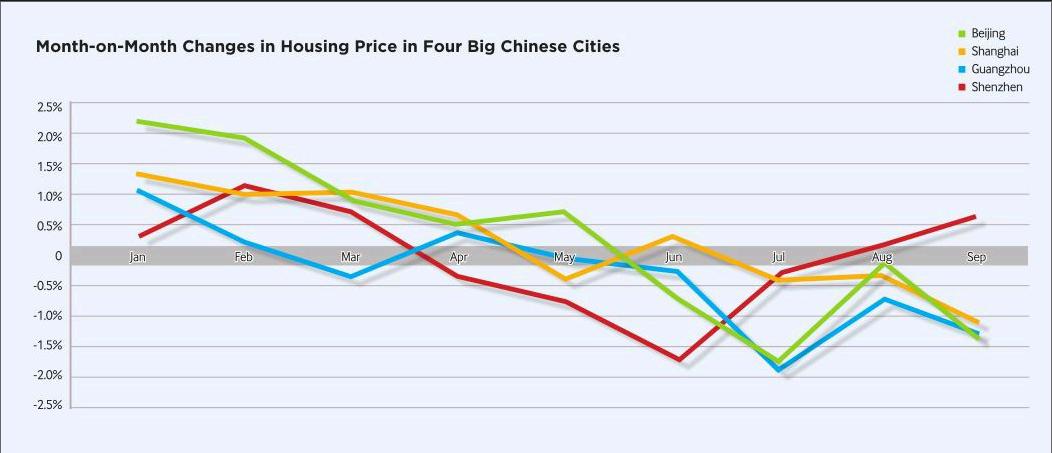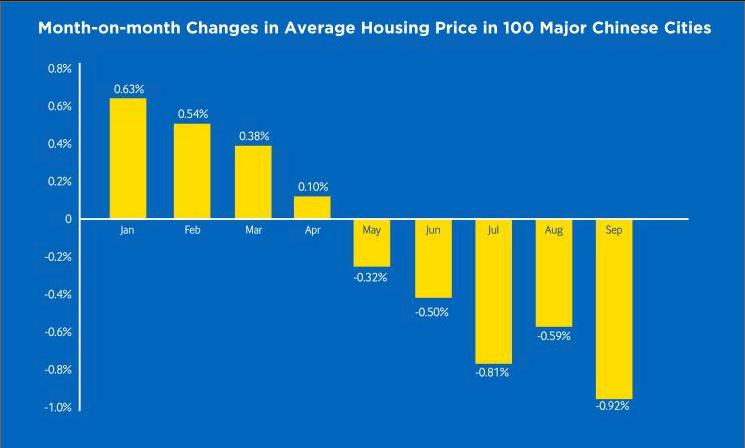Stemming the Slump
2014-11-10ByZhouXiaoyan
By+Zhou+Xiaoyan



Wang xingli is a realtor in Beijing. Instead of resting during the seven-day National Day holiday (October 1-7), he followed a jam-packed schedule spent bustling about showing apartments to eager clients around the citys North Third Ring Road.
After several months of a sales slump, this business is exactly what he has yearned for. His potential clients enthusiasm has been re-ignited as the Peoples Bank of China(PBC), the countrys central bank, relaxed lending rules for home buyers right before the holiday.
Promoting the favorable lending policy has become the top priority for real estate agents like Wang. He even went as far as designing a PowerPoint presentation during the holiday to explain the new policy to his clients.
“Even the slightest cut in mortgage rates can save buyers a large amount of money. Immediately after the release of the new lending policy, many buyers called to consult me on its implications; some even cancelled their traveling plans for the holiday to view apartments. They are afraid that prices will go up in coming months. The sellers have also gotten tough, refusing to budge on price,” Wang said.
On September 30, the PBC and the China Banking Regulatory Commission(CBRC) relaxed lending rules for home buyers, allowing banks to offer a maximum 30-percent discount to first-time home buyers, a group that has been expanded to include those who already own one property but have paid off their mortgage.
Prior to the announcement, second home buyers were required to place at least 60-percent down payments and mortgage rates were set at no less than 1.1 times the benchmark interest rate.
In 2011, skyrocketing home prices forced the Chinese Government to roll out restrictive measures, such as requiring higher down payments, increasing the lending rate for second home purchases and banning the purchase of a third home.
The new policy followed sluggish sales data, a slump in investment and continuously dropping prices in the property sector so far this year. In September, home prices in 100 cities monitored by the China Index Academy, a Beijing-based property research organization wholly owned by SouFun Holdings Ltd., fell 0.92 percent from August, the fifth consecutive monthly drop in 2014 and the biggest slump in four years.
Central authorities have also made it easier and cheaper for home buyers to use the housing provident fund. On October 13, central authorities said they will exempt notarial, guarantee and mortgage insurance fees as well as valuation charges for new and existing homes that are financed by the government housing provident fund.
Saving the market
The housing provident fund is a governmentdesigned savings plan that allows Chinese workers and their employers to pay a part of their monthly wages into the fund to finance future home purchases. Starting from October 14, borrowers are allowed to use the fund to buy homes in their hometowns after paying into the fund in the cities in which they are working.
The easing of housing credit conditions marks a turning point in the nations restrictive home purchasing policies. Experts say the gains of the policy remain to be seen in coming months and an industry-wide adjustment in the property sector is bound to persist in coming years.
The real estate market accounts for about 15 percent of the broader economy and affects 40 industries ranging from home appliances to glass, cement and steel. In the face of a flagging property sector, the Chinese Government plans to use alternative drivers—such as infrastructure construction and reform measures—to bolster growth in the worlds second largest economy.
Earlier this year, many cities removed or loosened their home purchase bans in the sluggish property market. A total of 46 Chinese cities had imposed bans on the purchase of a third home in efforts to curb speculation in the market. At present, only five cities—Beijing, Shanghai, Guangzhou and Shenzhen in Guangdong Province, and Sanya in Hainan Province—still maintain the ban.
But scrapping purchase bans seems to have had little effect in lifting the sector.
According to the National Bureau of Statistics, out of 70 major Chinese cities, new homes in 68 saw month-on-month price declines in August, compared with 64 in July. The total floor space of new homes sold declined 10 percent year on year during the January-August period while sales slumped by 10.9 percent. The floor space of new housing projects nosedived 14.4 percent during the same period.
Analysts say the relaxation of lending rules is a more aggressive measure to save the property sector, which is extremely sensitive to credit conditions.
Du Bingguo, head of research for the China Index Academy, said the new lending policy will help unleash demand from those who wished to upgrade their homes but were unable to buy a house under the previous stringent policies.
“But what is more important is it has shifted market sentiment, which will boost turnover and halt the price declines,” he said.
Du said he expects sales will hit their yearly peak in the fourth quarter, exceeding those of 2013s last quarter.

xu Hanfei, Chief Bond Analyst with Guotai Junan Securities, claimed softer demand in the property sector and a slump in property investment have imposed an increasingly worsening drag on the broader economy.
“Loosening the constraints on home lending to a certain extent can release pentup demand and boost the struggling sector,”xu wrote in a research note.
Spurred by the new policy, transactions of home purchases have rebounded. According to a report from the China Index Academy, there has been a conspicuous rebound in home purchase deals since the new lending policy was released on September 30. From October 6-12, 33 out of the 41 cities monitored saw month-on-month increases in home purchases. First-tier cities are leading the rebound in sold floor space by increasing 101.6 percent compared to the week before.
According to a report from the China Index Academy, compared to the removal of home purchasing curbs, credit loosening will play a larger role in boosting the cooling property market. Some property developers even planned to raise prices after the new policy was introduced.
“It will take some time for the effects of the new policy to kick in, because some home buyers are still very cautious. Therefore its too early to raise home prices,”said Huang yu, Executive vice President of the China Index Academy.
On the other side of the equation, experts say the maximum 30-percent discount on home loan rates will not reach many borrowers in practice as most banks are reluctant to offer large discounts on mortgages for fear of hurting their earnings.
“In the second half of 2008, banks were willing to offer 30-percent discounts on home loan rates because they were able to attract deposits at very low prices. But great changes have taken place over the past six years. The boom in Internet finance services has forced banks to launch high-yield money management products to attract deposits, pushing up financial costs in banks. If they continue to offer 30-percent discounts to home buyers, they will be operating at a loss,” said yi xianrong, a researcher with the Institute of Finance and Banking under the Chinese Academy of Social Sciences.
Long-term prospect
In spite of the favorable new lending policies, some analysts have cautioned investors against thinking that the housing market could stage a stunning recovery. A glut of unsold or unoccupied homes and buyersexpectations of further price declines could temper any rebound.
Chen xiaotian, Deputy Secretary General of the Market Commission with the China Real Estate Association, said that it is hardly feasible to reverse the downward trend of the property sector in the immediate term. Chen forecasts that housing prices will continue to fall in November and December, but will pick up in the second half of 2015.
“Housing purchase deals have been shrinking since the beginning of this year, which means demand is stacking up. Since July, Chinas top 20 real estate developers have bought the least land in two years, which will result in a lack of supply in the second half of 2015,” Chen elaborated.
Wang Tao, Chief China Economist at UBS, said this round of housing market adjustment is entirely different from previous adjustments.
“The total supply has exceeded demand. Also, there has been a misallocation of resources. A glut of homes have been built in third- and even fourth-tier cities, while most people prefer to live in first- and second-tier cities,” Wang said.
Qin Hong, Director of the Policy Research Center with the Ministry of Housing and Urban-Rural Development, said Chinas property market is mired in an industry-wide adjustment and business reshuffle.
“First, the overall growth rate will decline and there will be differentiated growth between first-tier cities and second- and thirdtier cities. In addition, the demand for new homes will decline with secondhand homes being increasingly preferred. Finally, the market concentration ratio will be increased after a large number of smaller developers are crowded out by big ones. After the adjustment and reshuffle, the development level and quality of the whole industry will be improved,” Qin said.
“In the long run, in order to achieve sound and steady development in the property sector, reforms on the land system, fiscal and taxation system and the property tax should be pushed forward,” she said.
Li Daokui, Dean of the Schwarzman Scholars Program at Tsinghua University, said the property market is giving way to other growth drivers in China including consumption-based infrastructure investment, private consumption, and the “greening”of various production capacities in the steel and petrochemical industries, as well as in power generation.
On October 8, Premier Li Keqiang said that China will launch major investment projects in information networks, water conservancy and environmental protection this year. Premier Li also made it clear the government will accept a slightly lower overall growth rate than the 7.5 percent targeted for this year and rely more on reforms to generate new growth.
The nation is seeking to push reforms to put the worlds second largest economy on a more sustainable footing over the long term. In quest of this, the Chinese Government has launched several policies in hopes of spurring structural upgrading, ranging from streamlining administration and delegating powers to the lower levels, to adopting measures such as cutting the reserve requirement ratios for certain banks and reducing taxation on small and micro businesses.
“Wed rather use reforms to shore up growth instead of stimulus measures,”Premier Li said.
